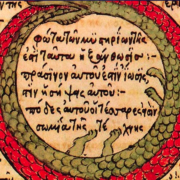The Law of Unintended Consequences and the Death of the Soul
Despite all the technological progress that has been made in the last century or two as humanity has taken over virtually every last habitable place on our planet, supported by what can only be referred to as revolutionary advancements in Science, the great discipline made famous by the likes of Newton and Einstein among others, we nonetheless find ourselves – collectively as a species, humanity as a whole – in a position where we are confronted with certain problems and challenges that, in order to be solved effectively to ensure the long term survival of humanity (on Earth anyhow), must be addressed collectively by all of the world’s nation states working together.
We’re speaking here primarily of course of the environmental crisis that goes by the name of Global Warming, which runs parallel to the mass extinction of species due to the loss of habitat and proliferation of humanity, as well as the problem basic access to resources like food, water and energy as the global ice caps melt and climate shifts leave many societies in brutal conflict for said resources. These challenges from an environmental, natural, perspective are coupled with the problem of nuclear proliferation which leavens us one insane tyrannical ruler away from global annihilation as well as shifts in the ideological landscape between not just East and West, but between secularism and religious fundamentalism which has left us with what we in the West refer to as Terrorism. One could certainly argue that any one of these challenges taken individually represents one of the gravest and most serious threats to humanity in the history of civilization, and then collectively of course, well that’s a problem of a different scope entirely.
The sheer scope and extent of these challenges, and the ideological landscape within which they have arisen, begs the question as to what extent, if at all, are they caused by the very intellectual, i.e. “Scientific”, breakthroughs that have underpinned the advance of modern civilization in the last century, and then the related question – one which we attempt to address here – to what extent if any can some of the challenges be solved by, or at least be supported by, a similar shift in intellectual paradigm. To borrow a saying from one of, if not the, most influential post-Enlightenment Era scientist Albert Einstein, “a problem cannot be solved by the same level of consciousness that created it.”
Let’s start with the assertion that every rational person (ok maybe almost every rational person) can see the forthcoming danger that lies ahead for us if we continue along this path of immense consumption and expansion, particularly in light of some of the nationalist and populist movements that are sweeping across the globe right now.[1] While many politicians and economists alike would like to think that economic growth in and of itself, may solve many of these global challenges – both at the local, nation-state, and global level – the rising tide that shall carry all boats as it were, this rationale is flawed in many ways. In particular, this approach does not address any of the ideological differences that underpin many of these global challenges. Economics alone, while certainly a tool at the disposal of the leaders of nation-states, i.e. politicians and lawmakers, does not address the root cause of many of the issues humanity as a whole face right now. Upon reflection, and many throughout the world (outside of the West) no doubt share this view, many of these alarming global trends can at least at some level be directly linked to, and in fact can be seen as a direct result of, the proliferation of capitalism as an ideological truth, thinly veiled by this notion of “Western Democratic Values”. Furthermore, it is this very ideological position, the very hallmark of Western society and culture, which is looked upon with disdain by many of the Islamic nation states in the Middle East and North Africa, providing the fuel for the fire if you will for not just anti-Western sentiment but, at the its most extreme, global terrorism in and of itself.
With respect to these global challenges, ideology being the source of at least one of the most alarming, and potentially dangerous, of them – i.e. terrorism and anti-Western sentiment – we also are confronted with the problem of Climate Change, i.e. Global Warming, which along with wealth inequality is also caused by, if only tangentially, by this underlying ideology in the West of not just capitalism, but materialism as well –ideologies that underpin Western culture that value the acquisition of goods and services i.e. wealth, over the public good, or the social good. In this sense, this “Western” ideology rests on the assumption that the pursuit of wealth and goods by the individual, encapsulated within a social and legal system which promotes such ideology, will eventually serve the public good, and the global good, as individuals pursue their own self-interest.[2]
The importance and significance of these underlying values to American, and in turn Western, society cannot be overstated, and arguably rest at the very heart of the United States from its inception, being built on the notion of a free market economy, i.e. the so-called invisible hand theory as put forth by the father of modern economics, the Scottish Enlightenment Era philosopher Adam Smith (1723-1790), author of the famous Wealth of Nations, one of the most, if not the most, influential economics texts in history.
But the annual revenue of every society is always precisely equal to the exchangeable value of the whole annual produce of its industry, or rather is precisely the same thing with that exchangeable value. As every individual, therefore, endeavours as much as he can both to employ his capital in the support of domestic industry, and so to direct that industry that its produce may be of the greatest value, every individual necessarily labours to render the annual revenue of the society as great as he can. He generally, indeed, neither intends to promote the public interest, nor knows how much he is promoting it. By preferring the support of domestic to that of foreign industry, he intends only his own security; and by directing that industry in such a manner as its produce may be of the greatest value, he intends only his own gain, and he is in this, as in many other cases, led by an invisible hand to promote an end which was no part of his intention. Nor is it always the worse for the society that it was not part of it. By pursuing his own interest he frequently promotes that of the society more effectually than when he really intends to promote it. I have never known much good done by those who affected to trade for the public good. It is an affectation, indeed, not very common among merchants, and very few words need be employed in dissuading them from it.[3]
This basic, core belief in the pursuit of individual self-interest not just as fundamental right then, but as a matter of the public good, rests at the very heart of “Western values”, and despite its clear merits, sits at the very root of the ideological divide between the West and its modern day antagonist religious (and mostly Islamic) fundamentalism, ideologies that are geographically affiliated with regimes and/or movements in the Middle East and Northern Africa. And even while many in the scientific community at least have identified ways for us to avoid, or at least mitigate, some of these global challenges and problems – at least those related to climate change and global warming and its corollary the mass extinction of species and their habitat across the globe – we nonetheless find ourselves collectively as a species, as a collection of nation states spread across the Earth, fundamentally unable to change our behavior in any meaningful way, or adapt or adjust our ideological perspective in any meaningful way, to truly address said challenges with any meaningful sort of impact – which arguably given the scale of the problem should come as no surprise perhaps.
What we have found, at least with respect to the ideological divide between Western values and religious fundamentalism or extremism, is that both sides tend to further dig into their respective ideological positions, while using standard diplomatic tools – the proverbial carrot and stick – that are not effective when dealing with a crisis of ideology necessarily. This challenge, where the standard tools at our disposal are fundamentally unfit for the job at hand, put us in an extremely precarious position as the only path forward seems to be war as both sides act in what they perceive to be in the interest self-preservation.[4]
Leaving the social and political solutions to the politicians and lawmakers throughout the world, one is tempted to ask – and in light of the very ideological basis of some of these global challenges in and of themselves one in fact must ask – not only to what extent are some of these global challenges and problems a result of a failure of ideology, but to what extent if at all can some of these problems and challenges be solved by an ideological shift, or at the very least to what extent can a fundamental intellectual paradigm change, one that is akin to what we went through toward the end of the Enlightenment Era, provide at least the rational foundations upon which a more broad set of solutions can be found or constructed upon. An intellectual bridge as it were not between East and West but between the secular and religious fundamentalist.
We can all agree for example that intellectual paradigms, what we sometimes refer to as “worldviews”, in and of themselves cannot fix or correct some of these problems or challenges that we are faced with. However it is at the same time quite possible that the current prevailing intellectual paradigms possibly (and in the author’s view in fact do) to a large extent stand in the way of finding possible solutions to the aforementioned global challenges, challenges that define our age arguably, as they effectively do not provide any intellectual middle ground between the two (or more than two depending upon how your define the current geo-political intellectual landscape) contrasting, global ideologies.
One can for example look at the current geo-political trends of nationalism and populism which have spread across not just the West but across the world now as well, reactions to decades of globalism and liberalism that have been the hallmark of the geo-political landscape since the Cold War (arguably the intellectual driving force of the Arab Spring) as standing on very shaky intellectual, rational even, ground. For example, rationally speaking, how can the pursuit of fundamentally local and self-serving interests, the very definition of nationalism, not end up – in the medium or long term – at the very least exacerbating these global challenges that we face and at the very worst set off a global chain reaction of socio-political events that will forever change the world we live in. Couple this potential pernicious, albeit hypothetical, scenario with the problem of nuclear proliferation and the potential for mass destruction of nation-states, the wiping out of huge populations and societies, and potential permanent damage to the environment and the world within which we live and you can grasp why the author at least, and many other intellectuals and political leaders, believes we sit upon the precipice of an era not just of great potential, but also at the same time great destruction.
In other words, if we all dig in and protect our own self-interests, attempting to isolate and quarantine the world’s problems as it were (which is precisely the global trend we are seeing right now with nationalism and populism rising in popularity in the West), we should expect, and in fact we are arguably seeing, a sort of global backlash from those nation-states that are left “out” of the Western capitalist club if we may refer to it as such – e.g. Iran, North Korea, Russia or Syria. We also see, which is one of the trends that is driving nationalism and populism to a large degree, a sort of sociological quarantining of the current global refugee crisis, which is at least to some extent a result, or at least a byproduct, of this ideological shift toward the closing of borders which goes along with the nationalist agenda.
Now at the same time, much of this immigration crisis, if we may call it such, which in turn is close related to the problem of Terrorism, is a direct result, or at least is at least partially caused by, changing climates which are a result of Global Warming which in turn result in the depletion of, and greater competition of, limited natural resources. The rise of nationalism then, when properly understood, is a cycle that promotes and reinforces itself, and while the closing of borders solves (perhaps) the local problem as it were, it actually exacerbates the global problem, a problem which arguably is caused by, or at the very least is exacerbated by, Global Warming. The rational deduction here of course is that if the current socio-political trends continue, things will only get worse. We are left with two great adages – “doing the same thing over and over again and expecting a different result is the definition of insanity”, and then again Einstein’s sage advice “a problem cannot be solved by the same level of consciousness that created it.”
But certainly when backed into a corner, when a way of life or ideology itself is threatened or perceived to be threatened as we in the West at least perceive our way of life to be, it is understandable why we collectively, and again this speaks to the global trend of nationalism and populism, would revert to a more self-preservative mindset – to the heck with the world, we shall only look out for ourselves – when in fact this very mindset, if followed to its own rational conclusion, will be the very death of that which we hold so dear and are desperately trying to preserve. And as we look at these challenges that face humanity today, and as we explore the underlying intellectual paradigms and frameworks that of course underpinned and allowed for all of the wonderful and amazing advancements that make our lives so much better and easier in so many ways, we are faced with the somewhat daunting possibility – reality really – that these very same intellectual frameworks which have allowed for this “progress”, also prevent us at some level at least from solving these challenges.
But if we take a step back, and look at the current ideological landscape, look at the underlying intellectual foundations of these (respective) ideologies, operating under the premise that an intellectual paradigm shift while it may not necessarily be the solution, it may in fact be a requisite step in order that a solution be found (not necessary and sufficient per se but at least necessary), we may find that that which has yielded, been the intellectual source of, our beloved “progress”, is at the same time the root of the divide that sits between where we are as global community today – fractured and splintered and on the brink of global nuclear conflict – and where we potentially could be, given the technological advancements at our disposal. In other words what we are suggesting is that perhaps within the context of these intellectual lines, i.e. paradigms and frameworks, that we have drawn throughout this work between East and West, even if they are drawn along theo-philosophical and metaphysical lines ultimately reflecting two very distinct ontological and epistemological paradigms, we may find not only the source, the potential root cause, of some of the underlying challenges that we currently face as a global community, but also in turn perhaps the beginnings or a, or in the best case the, requisite ideological solution to illuminate a way forward that avoids conflict and assimilates the worldviews and perspectives of the entire global community. We’re talking about not just an epistemological shift here, but an ontological one as well, which can provide us with an intellectual vantage point from which our differences on the nation-state or socio-political level seem trite and inconsequential relative to the overarching themes and principles which underpin the new intellectual paradigm. A lofty goal, but worth pursuing in the author’s view (clearly).
A brief history of this fairly worn out and arguably oversimplified division between East and West is warranted here, given our use of the terminology. This distinction between East and West goes as far back in history to the 1st millennium BCE where the first the Greeks, and then the Romans, viewed their neighbors to the “East”, sometimes (most of the time) with disdain, the Greeks of course having a long and sordid history with the Persians – to the East – which led to many great conflicts, and some great films.[5] To the ancient Greeks, the Persians were “from the East”, as were the Indian cultures that they encountered during the conquests of Alexander the Great in the 3rd century BCE, reflected in the philosophical and historical literature by the so-called gymnosophists for example, Indian sages and mystics, that we find in the writings of Herodotus for example. Knowledge of the peoples beyond India to the (even further) East, did not come until centuries later, hence the designation of China as the “Far East”. This delineation of the “Orient” as the Far East, as distinct from the “West” are primarily products of the colonial period in (Western) history in the academic, historical, literature of the 19th and 20th century, even though the current trend in academia is to avoid this terminology as it is considered to be to be an oversimplification of cultural differences, and again a product of colonialization which is looked down upon by modern, liberal, scholars. There is certainly a strong case to be made for movements throughout academia to eradicate these somewhat outdated, and even (as argued by some) racists, delineation, implying of course that at some level the views of the West are superior to those of the East – socio-politically as well as intellectually. Having said that, there is still nonetheless some value in the categorical delineation, if for no other reason than it is widespread in the literature up until the last decade or two at the time of this writing.
However, we are attempting here to perform an inversion of sorts, or perhaps better put a replacement or metamorphosis, of that ideological worldview, and as such this arguably old-fashioned and outdated distinction between East and West does in fact serve us quite well as we look at the ontological and epistemological distinctions between these two intellectual paradigms that are characteristic of the East and West, at least from a theo-philosophical perspective which is the focus of this work primarily and as such remain, again at least theo-philosophically speaking, in stark contrast to each other. For when looking at these two worldviews through a metaphysical lens as opposed to a theological one, despite the interdependencies of these disciplines if we may call them such, we find significant and profound differences between the two perspectives, different worldviews, which reflect distinctive perspectives on the nature of reality itself, the nature of existence itself – what we refer to herein as ontology as opposed to metaphysics per se. While at first glance it might strike the reader as odd as to why or how an underlying ideology might (potentially) be the source of modern era challenges regarding Global Warming or Terrorism, upon reflection it should be quite clear that these struggles, as they play out on the geo-political landscape, are in fact ideological struggles to a large degree.
Underneath the democratic and capitalist, free market principles which underpin, and in some very real sense define, Western culture, what we are left with in the West is society and culture that is essentially dominated by a materialistic worldview materialism, a worldview that can be traced back to the Scientific Revolution which was largely driven by the twin philosophical Enlightenment Era movements of empiricism and rationalism – the founding principles of Science. And yet in the East the predominant worldview, even though influenced by the West in the last few centuries undoubtedly, still nonetheless harkens back to a much more ancient and holistic mindset – one of the reasons why in fact, during the colonialist era, that the West looked down upon the East, i.e. the Orient, providing of course the rational justification for colonialism itself. And yet this holistic (as juxtaposed with what we refer to herein as reductionist perspective is perhaps precisely the distinction between these two worldviews that is most significant when we are trying to ascertain the fundamental ontological and/or metaphysical differences between Western and Eastern worldviews, as it relates specifically to the challenges facing global society that we have described herein. And while at face value it might appear to be simply a different perspective, a different way of looking at the world – hence the term “worldview” of course – it nonetheless has vast implications with respect to not only how society should be structured, i.e. socio-political structures in general, but also on how individuals ought to behave and treat one another, i.e. morals and ethics.
We have seen already what the implications are of establishing a definition or perspective on reality, i.e. an ontology, that has at its core – its fundamental first principle as it were – the empirically driven objective realm which falls under the heading of Physics. This is what we refer to throughout as objective realism, which is one of, and perhaps the most important from a philosophical perspective, the byproducts of the Scientific Revolution that, in the West at least, is so ingrained into our worldview that we never even think to question it.[6] But the implications of our almost universally adopted “Scientific” worldview, which fundamentally rests upon empiricism really, in the West at least, goes well beyond simply just relegating theology to the study of religious practitioners or, from an academic perspective to the domain of Comparative Religion, it actually has the effect of yielding an intellectual foundation, an ontological framework, which is entirely bereft not just of any notion of theology, but also the integrally related notion of the Soul. The problem with this of course, which Kant deals with in great detail of course, is that when we dispose of theology on empirical grounds, we essentially abandon the intellectual (again primarily theological) foundations of morality and ethics – what we might call a an example of the law of unintended consequences.[7]
This is precisely what Kant argued for (or against depending upon perspective) in his body of work, his solution, his Metaphysics of Morals, representing according to most – and for good reason – the very height of Enlightenment philosophy. While his concerns were very much aligned with the topic at hand, with respect to the loss of ethics or morality at the feet of Science, or more specifically again in the face of rationalism and empiricism, the twin philosophical pillars of Enlightenment Era philosophy, or more graphically and explicitly what Nietzsche refers to as the “death of God”, Kant attacks the conclusions of both empiricism and rationalism as inadequate, making the case that a system of morality, ethics, can un fact be constructed based upon Reason itself. Kant in this argument concludes that God as well as the Soul are not simply ideas that belong in the study of humanities but are ontological imperatives in the sense that without them, our objective reality cannot be held to exist in any real sense.
Kant in many respects, was an idealist in very much the same tradition as Plato, arguing that material reality depends upon certain metaphysical notions or concepts without which it cannot exist – physically or conceptually in fact. Kant’s transcendental idealism, the very appropriate name given to his theo-philosophical system, based upon this notion of the pre-eminence of ideas over things, provides the intellectual foundations for the existence of morality and ethics, in and of themselves even without their theological predicates, based upon pure Reason – to Kant the defining and distinguishing characteristic of humanity, mankind really, itself.
While these domains had historically been relegated to theology Kant’s life work was to bring then back into the rational domain as it were, place these principles on rational footing, as they had been in ancient times following the tradition of Plato and Aristotle, among others, for example. In so doing, in placing ontological significance on Reason as the overarching truth, or tool, that must be utilized in order to establish the boundaries of knowledge as well as the governing principles, the basic motivating factors, of human behavior. This view again sits in stark contrast to a more confined, epistemologically speaking at least, objective realist or empiricist approach which had the perhaps unintended intellectual consequence of relegating morality and ethics, and again theology, to non-scientific, i.e. non-rational, domains. As is well known, it was the driving force of Kant’s work to elucidate the limitations of rationalism and empiricism which had been the hallmarks of Enlightenment Era philosophy up until Kant.
While exploring the landscape of possible ontological frameworks and systems of metaphysics that have been offered up by some of the greatest minds in the last century, we have undoubtedly found some drawbacks, some inherent limitations as it were. And at least from our vantage point, a vantage point that is aligned with the very first Western philosophers, we find that these systems – however powerful they are in describing “physical reality”, runs up against a brick wall when it comes to any other reality that may (or may not) exist beyond these physical boundaries. This includes the domain of Psychology as well, and of course the other domain that we are very interested in within the context of this work, the reality of supraconsciousness, the heart of Eastern theo-philosophical traditions and the Indian theo-philosophical tradition in particular, which within the context of this work subsumes Buddhism.
The metaphysical and ontological landscape that we explore in this work, in particular in the final Part therein, delves into various proposed intellectual frameworks from the very apex of the scientific and philosophical community – frameworks presented by the likes of David Bohm, Hugh Everett, and Robert Pirsig primarily – all extraordinarily powerful and encompassing in their ability to provide a cohesive and comprehensive intellectual framework, metaphysics really, for almost the entire domain of experience or reality, explaining not oly how the world can be viewed or understood, depending upon their specific perspective of course, but also how the “world”, i.e. the physical world primarily, works and behaves.
At the very least then, given the power and completeness, truth really (again at least from a metaphysical perspective), of each of the different models and intellectual frameworks within their own respective domains, despite their fundamentally different axioms and assumptions (first principles we may call them) illustrates that different intellectual frameworks can emerge in different disciplines and from different perspectives, and in different time periods and reflecting different worldviews, that are all no less true than the other – different maps for the same territory we might say to borrow Pirsig’s metaphor. Looking at the whole development of Western philosophy over time from this perspective in fact, yield perhaps the self-evident truth that what is true and seemingly self-evident one day can (possibility) be replaced with a better, or perhaps higher order, truth or model the next day as our understanding of the universe evolves and our understanding of the human psyche evolves along with it.
These are all some of the benefits of not just metaphysics in general, as it relates to the establishment of a framework of ideas or intellectual constructs that have (potentially) some static as well as dynamic (changing) aspects – like for example Pirsig’s Metaphysics of Quality which is modelled after precisely this delineation – but some of the benefits of the specific models we looked at (again Pirsig, Everett, and Bohm primarily) which have been crafted and tailored very specifically toward some of the challenges that we face, intellectually speaking, of the conflicting metaphysical and ontological paradigms that we are confronted by with the verity of both Classical Mechanics AND Quantum Mechanics in each of their respective domains. This is arguably one, if not the, great metaphysical challenge of our time. How can both of these models be true? How can the Universe be both local and deterministic and non-local and stochastic at the same time? Mathematically speaking, its actually not possible – hence the need for a higher order intellectual framework, Philosophy really – or more specifically metaphysics or ontology – to step in and help us solve the problem.
All of these models are not just dependent on, but in fact to a large degree, were created to propose solutions, answers, to such conundrums that have developed over time – and specifically the more modern conundrum of these two seemingly incompatible models of physical reality that we are confronted with in the Quantum Era, as our understanding of the universe has evolved. To this end these intellectual frameworks provide, at least to some degree, elegant answers (metaphysically) as to how both of these models and intellectual paradigms – again Quantum Theory and Relativity Theory, a further abstraction of Classical Mechanics – could both be true in their own domain, simultaneously in some sense. Having said that though, even though these models, these various intellectual paradigms that have been explored and analyzed in depth in this work, these systems of metaphysics as we call them, due to the nature of the problem they are attempting to solve must of course go beyond the domain from which the conundrum itself is sourced, i.e. Physics, given that these two pillars of modern Science – again Classical Mechanics and Quantum Mechanics – effectively can both NOT be true with respect to the totality and expanse of reality in an ontological, existence or being itself, sense. In other words, to borrow David Bohm’s terminology, there must exist some higher order truth, higher order order, what he calls an implicate order, from which these two seemingly contradictory explicate orders can both be true in their own specific domain. A higher order truth which gives rise to the lower order truths, in this case Quantum Mechanics and Relativity Theory. [Incidentally, in order to solve this problem, much to the chagrin of physicists, one must turn to Philosophy, an inversion of the ontological paradigm of the knowledge domains in academia today where Philosophy is relegated to the humanities and is considered to a large extent less true than Physics, which ironically was the way knowledge, sciencia, was structured in antiquity, up until the Enlightenment really, where metaphysics was ontologically superior to, or was studied before, Physics.]
What can be said with certainty however though is that all of these various intellectual paradigms that we have looked at, systems of ontology or metaphysics, all originating in the West mind you, are in fact defined, or bound by, the intellectual paradigms within which these paradigms are devised – not by pure Science necessarily, for when we move from Physics to Metaphysics we are no longer constrained by the various assumptions and methodologies that are specific to the description of ”physical” reality (a description mind you that is awash in, and arguably obsessed with, perhaps by design and/or necessity by measurement, quantification or what we might call observables) – hence the reason why mathematics and Physics are so closely aligned. This exercise can be looked upon as a removal of these constraints, a journey up the intellectual food chain as it were, and an attempt to establish some sort of higher order intellectual paradigm within which Physics, and the rest of the Sciences really, can co-exist in a cohesive framework that not only provides us with a language and model for describing the various domains of knowledge that are encapsulated within it, but also provides a framework for incorporating (hopefully) future models and frameworks that have yet to be discovered.
The power in any intellectual model of course, and this is no less true for a system of metaphysics or ontology, is its ability to account for, and explain, a certain set of phenomena or ideas, as well as flexibility and adaptability (and in the case of physical mathematical models, accuracy and predictability) to incorporate ideas that were not necessarily considered when the framework was initially established. This is true for good software for example, as any experienced software engineer will tell you. A sign of a good program is one which solves problems, almost by accident, that it was not necessarily intended to, or designed to, solve, but yet – due to its sound and elegant design – nonetheless solves these problems as an unintended (positive) consequence of simply being well designed. In some sense, the “goodness” or “power” or a theoretical framework can be judged along these lines, to what extent it solves the problems it was designed to solve and to what extent it can be applied to different problems that it was not necessarily designed or intended to solve. Darwin’s Theory of Evolution is a good example of this.
However, even in the systems of metaphysics that we have explored, and by extension systems of ontology, arguably representing the very height of the (philosophical) intellectual landscape in the Quantum Era, they nonetheless carry with them a fundamentally “Western” bias and set of assumptions, in particular ontological assumptions regarding the scope and boundary of reality. In other words, generally speaking then, the underlying ontological assumptions, be they explicitly stated or simply implicit to the mode itself, effectively dictates the boundaries of the intellectual model. As such, given the Western bias, states of consciousness in general, and supraconsciousness more specifically, lays outside these models entirely, no matter how broad and encompassing they intend to be, they do not contend with this fundamental principle (at least fundamental from an Eastern worldview perspective) of reality. For example, not only are states of consciousness in and of themselves outside the bounds of these metaphysical models that we have touched on, any notion or conception of a Soul – either at the individual or collective level – is also not included or accounted for, given that again it is not a “verifiable” or “measurable” entity or “thing” in the Western, empirical sense. And it is through the vehicle of the Soul, as a sensory apparatus of experience, that Eastern theo-philosophical traditions allow for inclusion of these higher states of consciousness not only in their ontological frameworks, their concept of reality, but also as an integral part of their epistemological model, their conception of what constitutes knowledge.
This is really the fundamental difference between the Eastern and Western worldviews, at least how we are defining them herein from a theo-philosophical perspective. These respective worldviews incorporate (more implicitly than explicitly) their conception of reality as well as their conception of knowledge, in modern philosophical circles of course referred to as their ontological and epistemological frameworks respectively. While it may seem like splitting hairs at first, the underlying assumptions and perspectives along these two seemingly theoretical and philosophical lines, actually there are significant implications not just from an epistemological or ontological perspective, but also from a behavioral, psychological and even sociological perspective as well with respect to the assumptions implicit within these respective worldviews with respect to these topics specifically. While most certainly the advancement of Science has all sorts of merits, and arguably its clean and total break from theology was not only justified but necessary in order for it to fully flourish into the discipline that it is today, it nonetheless in a sense forces all domains of knowledge that can be considered subjective in any way, i.e. cannot be empirically measured or “observed”, to the way side, to the domain of the humanities or the philosophers without really addressing the assumptions, or limitations, that come as a natural consequence to this epistemological division if we may call it that.
But what was lost when this split between Science and Religion occurred as a result of the Scientific Revolution and the Age of Enlightenment, an unintended consequence as it were, was the understanding that theology as domain of study was actually subsumed within metaphysics, i.e. that which was to be studied “before” Physics in Aristotle’s curriculum and parlance which was the standard curriculum in the West up until the end of the Middle Ages more or less. Throughout the entire history of academia really, since the time of Plato and Aristotle, up until the modern era really, theology had always been in fact a scientific endeavor – “scientific” in the sense that Aristotle used the word, i.e. as type of epistêmê meaning “knowledge” or “understanding” , prior to the term coming into the English lexicon as “science” through the Latin sciencia which of course has very specific connotations in the modern era and comes with all sorts of assumptions these days.
The point being, theology in antiquity was not a separate discipline, nor was the idea of the existence of the Soul. In antiquity, the existence of the divine what we today call God, as well as the existence of the Soul, were considered to be self-evident principles upon which any intellectual paradigm, any system of philosophy (theo-philosophy in our nomenclature) was to be constructed. As such, theology, in particular as the study of the origin of all things and/or the first principle – Aristotle’s prime mover or Plato’s Good for example – were just as much metaphysical and philosophical constructs as were virtue or courage. This meant of course that the characteristics of the Soul, it’s study and analysis, were very much a part of “philosophy” as the ancients saw it right up through the Middle Ages until the very end of the Enlightenment basically. Ethics and morality were philosophical disciplines, as products of the motivations of the Soul, disciplines that were based upon reason and rational argument, both from an individual perspective, as well as from a collective or socio-political perspective. In fact, for the majority of the history of Western thought, ethics, morality, logic, mathematics, astronomy, physics and metaphysics were all part of what we might call the “core curriculum”. Theology was not a separate discipline by any stretch, as the existence of God (the One), and the existence of the Soul, was presumed not just as self-evident truths but as final deductions of Reason itself.
This blind spot, if we may call it that, also has the somewhat unexpected consequence of being incapable of integrating the domains of ethics or morality, relegating these fields of study to at best the humanities (frowned upon by the pure Scientists whether openly or behind closed doors), or perhaps even worse to the domain of theology, relegated to Divinity or Comparative Religion scholars at a limited number of universities throughout the West. This is definitely not what the original philosophers, our Western forefathers, intended – for Plato and Aristotle, and the Stoics and Peripatetics (the list goes on), ethics and morality, what they called arête (loosely translated as virtue) was the essence, if not the underlying purpose of, philosophy – philosophia – as a discipline in and of itself. One could certainly argue that the reason for this, the intellectual divide as it were, is that modern intellectual paradigms, in the West at least, fundamentally lack, or refuse to identify or acknowledge, the reality of the Soul – arguably the linchpin metaphysical construct which underpins ethics or morality in any form. For if there is no Soul, and the goal of life is simply to maximize pleasure for the individual (or the inverse, the other side of that coin as it were, to minimize pain for the individual), and no aspect, part of component of the individual persists beyond death – no Heaven or Hell – then one can certainly make the argument, and many have throughout history, that the pursuit of the greater good and righteousness in general – what the ancients called virtue – the hallmark characteristics of any system of ethics or morality, the intellectual cornerstone as it were, would be pointless, having no merit in this world of the next.[8]
This intellectual blind spot, again if we may call it that, this lack of ethical or moral foundation which is characteristic of virtually all modern Western systems of metaphysics for the most part, a function of and direct consequence of the ascension of Science and the related “non-humanities” disciplines along the Western intellectual landscape, as reflected in the rise of atheism in academic and intellectual circles in modern times, and in turn taught to future generations through the lens and paradigm of “empirical truth”, has some significant drawbacks as it turns out – not necessarily for the power and strength of the disciplines and fields of study themselves, but for society as a whole who looks upon theses disciplines, as they are formulated and crafted in academia and beyond, the very heart and citadel of science upon which Western society rests.
[1] At the time of this writing, Brexit – the departure of the UK from the EU – was underway and Donald Trump is President of the United States promoting and advancing highly populist, what he himself has called “nationalist”, policies.
[2] While there is evidence to support this, that capitalism as it takes hold in third world countries does in fact lead to great increases in wealth across the entire socio-political spectrum (Dr. Jordan Peterson for example supports and espouses these views, and they are backed up by sound research), while this addresses the issue of poverty and access to basic resources it does not address the environmental or ideological issues that we discuss here.
[3] The Theory of Moral Sentiments (1759), by Adam Smith. Part IV, Chapter 1. From Wikipedia contributors, ‘Invisible hand’, Wikipedia, The Free Encyclopedia, 8 October 2017, 21:09 UTC, <https://en.wikipedia.org/w/index.php?title=Invisible_hand&oldid=804412698> [accessed 29 October 2017].
[4] Example of this are the ongoing conflicts between the West, mostly the United States, and Iran as well as North Korea.
[5] Alexander the movie, directed by Oliver Stone in 2004 being perhaps the author’s personal favorite depicting Alexander the Great’s conquest of the “East”.
[6] A survey of alternative, modern day ontological frameworks such as Bohmian Mechanics, Hugh Everett’s Universal Wave Function or even Robert Pirsig’s Metaphysics of Quality is explored in some detail in the Chapter in this work on Comparative Ontology in Part V of this work.
[7] Atheists, or even naturalists would take issue with this conclusion, arguing that systems of morality and ethics can be constructed on ration grounds alone, and in fact this is precisely what Kant attempts to do with his work. But ths point here is not necessarily that it is impossible to do without some appeal to a larger power as it were, i.e. theology, or the existence of a Soul, but that it requires a wholesale revision of morality and ethics in general, given the long history of their relationship to theology.
[8] This is essentially the doctrine of the Epicureans and their closely related cousins the hedonists from antiquity believed, not having much faith in either the existence of the gods or their interest in human affairs.










Leave a Reply
Want to join the discussion?Feel free to contribute!